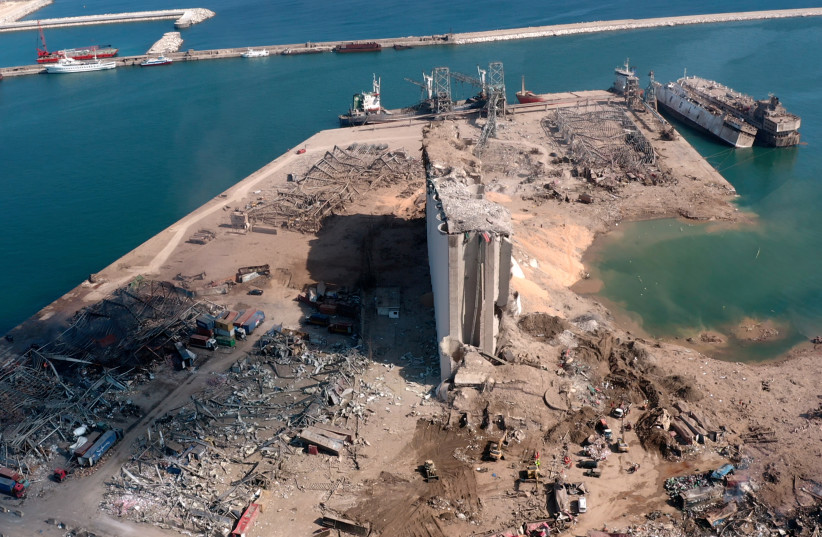The Lebanese literature professor Charif Majdalani has penned an elegant and intensely personal account of the economic and political meltdown of his country. The contrast between the rich, even opulent language he employs (translated from the French into English by Ruth Diver) and the onerous struggles of his family and of ordinary Lebanese is a stark one.
Majdalani’s entry about the August 4, 2020 blast at the Beirut port, which killed 218 people and wounded more than 7,000 others, is breathtaking. “Suddenly the floor begins to move with incredible violence, accompanied by a sort of hideous roar. I’m petrified as I feel the terrace come and go beneath me like an old swing and I think it’s obviously an earthquake.”
The massive explosion caused by the storage of ammonium nitrate, allegedly by the Lebanese terrorist movement Hezbollah, left an estimated 300,000 people homeless and caused more than $15 billion in property damage.
The book is a no-holds-barred reckoning with a fundamentally corrupt political system, which is now controlled by Hezbollah, in a country where the “unreliable electricity supply” is a recurring theme, weaving its way through the diary against the background of Lebanon’s mountains and the cedar trees that blanket the country.
He engages in a ruthless criticism of the Lebanese politician Gen. Michael Aoun from a Maronite Christian family, Walid Kamal Jumblatta, Lebanese Druze politician and the Lebanese Shi’ite parliament speaker Nabih Berri for their creation of a mafia state that benefits a ruling class at the expense of ordinary Lebanese.

Majdalani has a keen literary eye for details. He reports on graffiti that reads: “The government is trying to overthrow the people.” The dire protests of the Lebanese against rotating new governments remind the reader of the German playwright Bertolt Brecht’s poem “The Solution,” about the uprising of 1953 against the East German communist government, where he writes of workers’ protests against Stalinist repression:
“Would it not in that case be easier
for the government
To dissolve the people
And elect another?”
Just as East Germany had the totalitarian Socialist Unity Party, aka the East German Communist Party, Lebanon has its own version – and it is called the Party of God, or Hezbollah. “And among those parties is the most dangerous one of all, Hezbollah, the only party that is still armed, on the pretext of fighting the Israeli occupation of the southern provinces where there have been no Israeli troops for 15 years but in fact so that the party can be used as an instrument of pressure and destabilization in Syrian and Iranians hands,” writes Majdalani.
He adds in a July 24, 2020, entry: “Yesterday, Hezbollah claimed an attack against Israel soldiers. Everyone tends to think that the Shi’ite party might provoke a war and complete the devastation of what is left of the country in order to save its own stake and that of Syrian-Iranian axis.”
One small quibble I have with Majdalani’s fine book is that his Francophilia does not allow for any criticism of Paris’s long-standing support for Hezbollah. French President Emmanuel Macron has met with a Hezbollah politician in Lebanon – thereby helping to mainstream the party that has been designated a terrorist entity by the US, Canada, the Gulf Cooperation Council, Israel, Germany, Japan, Austria, the Arab League, and many additional European and Latin American countries.
France has blocked a full designation of the entirety of Hezbollah’s structure as a terrorist organization by the EU. As a result, the organization can continue to garner financing on French soil and in other parts of Europe, under the fiction of having separate civilian and military wings.
One ingenious part of Majdalani’s diary is to include a kind of diary within his diary. He includes pages on his wife Nayla’s self-directed therapy sessions with herself. Titled “My therapy with my myself,” he uses extracts from her work as a therapist with herself as a form of a talking cure.
After the Beirut explosion, Nayla stopped her self-therapy. Majdalani expresses a kind of awe for the Lebanese volunteers who sought to clean up and rebuild Beirut after the mass explosion. The combination of the explosion, the COVID-19 pandemic and the bottomless pit of economic and political corruption from the Hezbollah-controlled political system helps to explain why Majdalani’s 2020 Diary of the Collapse has continued into 2022.
The future remains desperately bleak for Lebanon. Sadly.
Beirut 2020: Diary of the Collapse
By Charif Majdalani
Other Press
192 pages; $14.99
